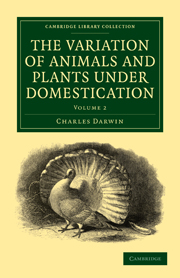Book contents
- Frontmatter
- Contents
- CHAPTER XII INHERITANCE
- CHAPTER XIII INHERITANCE continued – REVERSION OR ATAVISM
- CHAPTER XIV INHERITANCE continued – FIXEDNESS OF CHARACTER – PREPOTENCY – SEXUAL LIMITATION – CORRESPONDENCE OF AGE
- CHAPTER XV ON CROSSING
- CHAPTER XVI CAUSES WHICH INTERFERE WITH THE FREE CROSSING OF VARIETIES – INFLUENCE OF DOMESTICATION ON FERTILITY
- CHAPTER XVII ON THE GOOD EFFECTS OF CROSSING, AND ON THE EVIL EFFECTS OF CLOSE INTERBREEDING
- CHAPTER XVIII ON THE ADVANTAGES AND DISADVANTAGES OF CHANGED CONDITIONS OF LIFE: STERILITY FROM VARIOUS CAUSES
- CHAPTER XIX SUMMARY OF THE FOUR LAST CHAPTERS, WITH REMARKS ON HYBRIDISM
- CHAPTER XX SELECTION BY MAN
- CHAPTER XXI SELECTION–continued
- CHAPTER XXII CAUSES OF VARIABILITY
- CHAPTER XXIII DIRECT AND DEFINITE ACTION OF THE EXTERNAL CONDITIONS OF LIFE
- CHAPTER XXIV LAWS OF VARIATION – USE AND DISUSE, ETC
- CHAPTER XXV LAWS OF VARIATION, continued – CORRELATED VARIABILITY
- CHAPTER XXVI LAWS OF VARIATION, continued – SUMMARY
- CHAPTER XXVII PROVISIONAL HYPOTHESIS OF PANGENESIS
- CHAPTER XXVIII CONCLUDING REMARKS
- INDEX
CHAPTER XXVIII - CONCLUDING REMARKS
Published online by Cambridge University Press: 05 July 2011
- Frontmatter
- Contents
- CHAPTER XII INHERITANCE
- CHAPTER XIII INHERITANCE continued – REVERSION OR ATAVISM
- CHAPTER XIV INHERITANCE continued – FIXEDNESS OF CHARACTER – PREPOTENCY – SEXUAL LIMITATION – CORRESPONDENCE OF AGE
- CHAPTER XV ON CROSSING
- CHAPTER XVI CAUSES WHICH INTERFERE WITH THE FREE CROSSING OF VARIETIES – INFLUENCE OF DOMESTICATION ON FERTILITY
- CHAPTER XVII ON THE GOOD EFFECTS OF CROSSING, AND ON THE EVIL EFFECTS OF CLOSE INTERBREEDING
- CHAPTER XVIII ON THE ADVANTAGES AND DISADVANTAGES OF CHANGED CONDITIONS OF LIFE: STERILITY FROM VARIOUS CAUSES
- CHAPTER XIX SUMMARY OF THE FOUR LAST CHAPTERS, WITH REMARKS ON HYBRIDISM
- CHAPTER XX SELECTION BY MAN
- CHAPTER XXI SELECTION–continued
- CHAPTER XXII CAUSES OF VARIABILITY
- CHAPTER XXIII DIRECT AND DEFINITE ACTION OF THE EXTERNAL CONDITIONS OF LIFE
- CHAPTER XXIV LAWS OF VARIATION – USE AND DISUSE, ETC
- CHAPTER XXV LAWS OF VARIATION, continued – CORRELATED VARIABILITY
- CHAPTER XXVI LAWS OF VARIATION, continued – SUMMARY
- CHAPTER XXVII PROVISIONAL HYPOTHESIS OF PANGENESIS
- CHAPTER XXVIII CONCLUDING REMARKS
- INDEX
Summary
As summaries have been added to nearly all the chapters, and as, in the chapter on pangenesis, various subjects, such as the forms of reproduction, inheritance, reversion, the causes and laws of variability, &c., have been recently discussed, I will here only make a few general remarks on the more important conclusions which may be deduced from the multifarious details given throughout this work.
Savages in all parts of the world easily succeed in taming wild animals; and those inhabiting any country or island, when first invaded by man, would probably have been still more easily tamed. Complete subjugation generally depends on an animal being social in its habits, and on receiving man as the chief of the herd or family. Domestication implies almost complete fertility under new and changed conditions of life, and this is far from being invariably the case. An animal would not have been worth the labour of domestication, at least during early times, unless of service to man. From these circumstances the number of domesticated animals has never been large. With respect to plants, I have shown in the ninth chapter how their varied uses were probably first discovered, and the early steps in their cultivation. Man could not have known, when he first domesticated an animal or plant, whether it would flourish and multiply when transported to other countries, therefore he could not have been thus influenced in his choice.
- Type
- Chapter
- Information
- The Variation of Animals and Plants under Domestication , pp. 405 - 432Publisher: Cambridge University PressPrint publication year: 2010First published in: 1868



